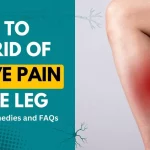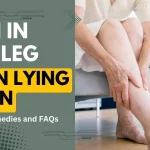Experiencing leg pain at night can be disruptive and prevent you from getting a good night’s sleep. There are various potential causes of nighttime leg pain including muscle cramps, restless leg syndrome, injury or overuse, and medical conditions like peripheral artery disease or diabetes. Fortunately, there are many home remedies and lifestyle changes you can try to find relief from nighttime leg discomfort. This article explores the common causes of leg pain at night and provides home remedies to try for relief.
Causes of Nighttime Leg Pain
Muscle Cramps
Muscle cramps or charley horses are involuntary and sudden contractions of muscles that cause intense pain. Cramps often occur at night and affect the calves, thighs, and feet. Muscle fatigue from overuse, dehydration, mineral deficiencies, pregnancy, and medication side effects can trigger leg cramps at night.
Restless Leg Syndrome
Restless leg syndrome (RLS) is a condition causing uncomfortable sensations like itching, tingling, crawling, or throbbing in the legs. These sensations create an irresistible urge to move the legs. RLS symptoms are worse at night and during periods of inactivity. The exact cause is unknown but may involve abnormalities in dopamine levels.
Injury or Overuse
Strenuous exercise, physical activity, or sports injuries can strain muscles or cause microscopic tears in leg tissues. Delayed onset muscle soreness causing pain at night may occur 24-72 hours after intense physical activity. Pain that worsens at night may indicate a more serious injury that requires medical attention.
Peripheral Artery Disease
Peripheral artery disease causes narrowing of arteries supplying blood to the legs. Fatty plaque buildup inside artery walls limits blood circulation leading to leg pain when lying down at night. Those with diabetes, high cholesterol, smoking, obesity, or a family history have increased risks.
Diabetes
Uncontrolled blood sugar levels in those with diabetes can damage nerves causing diabetic neuropathy. Nerve damage in the legs can produce burning, shooting pains, tingling, and cramps especially at night. Managing blood sugar levels helps prevent further nerve damage.
Home Remedies for Nighttime Leg Discomfort
Gentle Stretching
Doing light stretching focusing on the calves, hamstrings, quadriceps, and hips can help relieve muscle tightness or cramps causing night leg pain. Stretches when waking up in the middle of the night provides relief.
Massage
Gently massaging legs in a downward motion towards the feet can relax tense muscles. Using lotion or coconut oil can make the massage more soothing. Light kneading and compression of painful spots brings relief.
Heat Therapy
Applying a heating pad or warm towel to sore leg muscles relaxes them while improving circulation. Take caution against burns and don’t sleep with heating pads on. Warm baths before bed can also reduce leg tension.
Cold Therapy
For sudden acute injuries causing night pain, applying an ice pack for 10-15 minutes reduces inflammation. Ice massage gently rubbing ice over legs also helps decrease leg pains. Don’t apply ice directly to skin.
Compression
Wearing compression socks, sleeves, or stockings improves circulation, reduces swelling, and provides support to leg muscles and veins. Compression worn during the day can prevent nighttime leg cramping.
Massage Oils
Massaging sore muscles with essential oils like lavender, ginger, peppermint, or eucalyptus provides relaxation. Oils absorb into skin and stimulate receptors reducing feelings of discomfort.
Epsom Salt Baths
Soaking legs in warm water mixed with Epsom salts rich in magnesium, increases magnesium absorption. Magnesium relaxes muscles and eases cramping, stiffness, and achiness at night.
Stay Hydrated
Dehydration is a common cause of muscle cramps at night. Be sure to drink plenty of water and electrolyte rich fluids like coconut water during the day. Limit alcohol and caffeinated drinks that have dehydrating effects.
Potassium Rich Foods
Foods high in potassium like bananas, avocados, yogurt, spinach, and sweet potatoes help maintain fluid balance and prevent muscle cramps. Make sure to get sufficient potassium daily through diet and supplements if needed.
Magnesium Supplements
Ask your doctor about taking a magnesium supplement as deficiency is linked to nighttime leg cramps and restless leg syndrome. Magnesium citrate or glycinate are highly absorbable forms that relax muscles.
Vitamin D
Getting sufficient vitamin D improves calcium absorption important for muscle function. Take vitamin D supplements with doctors approval if you have frequent leg cramps and night pain. Get 15 minutes of sunshine daily.
Light Exercise
Low impact exercises like walking, swimming, or cycling a few hours before bedtime prevent night cramps. Light exercise increases blood flow and stretches leg muscles. Avoid vigorous late night workouts that over fatigue.
Proper Footwear
Wearing supportive and comfortable shoes during the day prevents leg and foot muscle fatigue leading to cramps at night. Replace worn shoes every 6 months or 500 miles.
Night Splints
Wearing night splints gently keep ankles flexed and calves stretched to prevent tightening up. Splints reduce night cramps especially in those prone to daily calf tightness.
Avoid Stimulants
Beverages with caffeine like coffee, energy drinks, and soda can increase muscle tension and restlessness in the legs. Limit caffeine intake especially in the late afternoon and evening.
Proper Sleeping Positions
Sleeping with legs extended without bending prevents cramps and stiffness from muscles overnight. Use a pillow between knees if sleeping on your side. Stretch legs before getting out of bed.
Elevate Legs
Keeping legs elevated 6-12 inches above your heart when lying down improves circulation reducing swelling, throbbing, and discomfort in legs. Use pillows propped under calves and ankles when resting.
Leg discomfort can disrupt sleep quality and wellbeing. Understanding the various causes of night leg pains like muscle cramps, restless leg syndrome, overuse, and circulatory issues allows proper treatment. Simple lifestyle measures like stretching, massage, hydration, diet, compression, heating and cooling provide low risk pain relief. Seeking medical advice for ongoing or worsening leg pains at night may be needed to diagnose underlying conditions. Implementing home remedies and positive sleep habits allows you to rest comfortably at night.
Frequently Asked Questions
What are some warning signs of a serious health issue causing leg pain at night?
Seek immediate medical care if you experience sudden, severe, or worsening leg pain at night accompanied by numbness, weakness, swelling, loss of bladder or bowel control. These may indicate a blood clot, stroke, nerve damage or other emergency.
Why do my restless legs keep me awake at night?
RLS is caused by faulty signaling in the brain disrupting normal nerve impulses in the legs. RLS symptoms emerge with inactivity and worsen overnight. Managing underlying conditions like iron deficiency or diabetes can provide relief. Medications, good sleep hygiene, massage, and hot baths help symptoms.
Why do my legs hurt more when I try to sleep?
Lying down takes pressure off muscles and allows lactic acid buildup from the day’s activities to cause soreness. Gravity no longer pulls blood evenly back to the heart causing fluid buildup and swelling. Light activity and stretching before bed prevents worsening.
What deficiencies cause leg cramps?
Low levels of electrolytes like potassium, calcium, and magnesium are common causes of muscle cramping at night. Diuretics, digestion issues, diabetes, and poor diet can contribute to deficiencies. Eating mineral rich foods and supplements prevents cramps.
Can peripheral artery disease cause night leg pain?
Yes, PAD narrowing leg arteries can lead to cramping or dull aching pain when lying in bed at night. Gravity no longer pulls blood efficiently through restricted vessels causing discomfort. Managing risk factors like high blood pressure provides relief.



